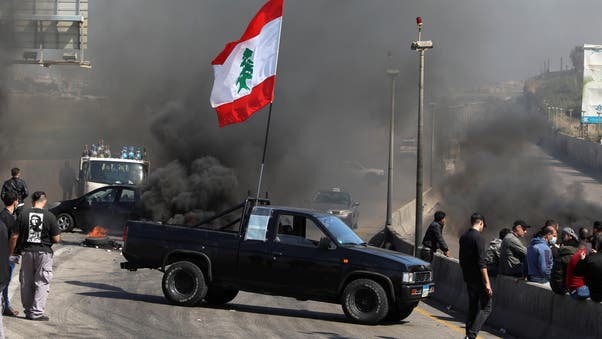Hezbollah’s dirty street tactics will backfire again while Lebanese suffer
Makram Rabah/Al Arabiya/March 12/2021
مكرم رباح: تكتيكات حزب الله القذرة سترتد نتائج عكسية بينما يعاني اللبنانيون
Lebanon has once again erupted into street violence as images and videos of its people fighting over powdered milk and other food items which are now rare commodities in a country which has seen its dollars exchange soar to an all-time high of 10,000 and rising.
As expected, the rise of the dollar exchange led to the return of the popular protest, although with less numbers, but with a more aggressive undertone followed by nationwide roadblocking – paralyzing the entire country.
Although these violent manifestations were not restricted to any specific area, the primer which set the tone for the unrest was orchestrated by Hezbollah and its Shia ally the Amal Movement who wanted to redirected blame from the abysmal economic situation which is almost entirely of their own making.
While both Hezbollah and Amal have denied these allegations, it is clear that many of the protests which broke out in areas dominated by them had clear instructions, with the aim of redirecting blame and wished to put more pressure on Prime Minister designee Saad Hariri as well as Hezbollah’s main Maronite ally President Michel Aoun to form the next cabinet. While the Shia pro-Hezbollah youth who were chanting slogans against Aoun and calling for a siege of the Baabda presidential palace simply petered out, they were able to motivate other regions across Lebanon to protest.
This is the same tactic Hezbollah used at the beginning of the October 17, 2019 revolution – it backfired then and is doomed to fail again.
Trying to use the street and take the moral high ground does not work when Hezbollah itself is hugely responsible for Lebanon’s corruption and economic collapse – whether it be by using Lebanon as a base for Iran’s regional expansionist ambitions, or by protecting the Lebanese political elite and their fathomless appetite for corruption.
Above all, it is no coincidence that the upsurge of protest came at the heels of the Maronite Patriarch Bechara Boutros al-Rahi’s call for Lebanon’s neutrality and for the reinstatement of the state’s full sovereignty – a direct condemnation of Hezbollah’s illegal arms and their infringement on Lebanon’s sovereignty – and going as far as to declare that the Lebanese state is under occupation. Rather than engaging al-Rai, Hezbollah and its allies opted to avoid reality by augmenting already volatile economic conditions and put calls for political action on the back burner.
Furthermore, Hezbollah has become more dangerous as the group has been forced into a corner – it can no longer blame Saad Hariri, or the Arab Gulf states for Lebanon’s catastrophic economic collapse. Doing the former is impossible as Hariri has been out of office for too long, while the latter would concede that Saudi Arabia, the United Arab Emirates, Kuwait and other rich Arab states were indeed behind Lebanon’s prosperity and stability, and that essentially it was Iran and its violent Lebanese proxy which turned the country into a failed state.
This reality also reveals that Hezbollah’s continued coup and street fighting tactics have no long-term benefits. No amount of bullying nor coercion can remedy the country’s ever increasing debt problems.
The best-case scenario for Hezbollah and Lebanon’s corrupt political elite is for them to succeed in forming a government under Hariri, one which the militia group and Gebran Bassil, President Aoun’s son-in-law, would manipulate.. Even then, the best they can hope for is to acquire the $10 billion in bailout money from the International Monetary Fund – something which at this bleak stage seems highly unlikely.
Lebanon needs at least $30 billion to have a fighting chance to recover from this cancerous political and economic ailment, yet neither the international community nor the Gulf states are in any hurry to bankroll another Ponzi scheme run by the Lebanese banks that funnels money into the pockets of Hezbollah and Lebanon’s greedy politicians.
The Lebanese are left with nothing other than resorting to road blocking and violent protest to voice their anger. But in doing so, protestors must realize that any action that isn’t focused against the corrupt establishment will be manipulated by Hezbollah, a group which has already proven that it will stop at nothing to cling to power – even if it means standing in the ruins of a once beautiful nation.























